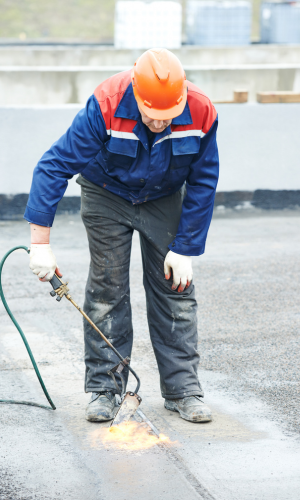The Different Types of Flat Roofing: Comparing EPDM, TPO, and PVC
Understanding Flat Roofing Systems
Before diving into the specifics of EPDM, TPO, and PVC, it is essential to understand the unique aspects of flat roofs. Unlike sloped roofs, flat roofs have a horizontal or nearly horizontal surface, providing distinct advantages and challenges. These types of roofs require proper drainage systems to prevent water pooling, and they offer additional space for HVAC units, solar panels, or recreational areas.
EPDM Roofing: Pros and Cons
EPDM, or Ethylene Propylene Diene Monomer, is a popular flat roofing material known for its durability and weather resistance. It is composed of a synthetic rubber membrane that is both lightweight and flexible. EPDM roofing offers several advantages, including:
- Exceptional durability and longevity, capable of lasting up to 40 years with proper maintenance.
- Superior resistance to UV rays, hail, and extreme weather conditions.
- Ease of installation and low maintenance requirements.
However, EPDM roofing is susceptible to punctures and tears, especially during the installation process or due to sharp objects. It also has limited color options and may have some environmental impact due to the materials used.
TPO Roofing: Pros and Cons
Thermoplastic Olefin, or TPO, roofing is gaining popularity due to its energy-efficient properties and ease of installation. This single-ply roofing membrane consists of a blend of ethylene-propylene rubber and polypropylene. The advantages of TPO roofing include:
- Excellent energy efficiency, reflecting sunlight and reducing cooling costs.
- Durability and resistance to UV rays, punctures, and tears.
- Flexibility and ease of installation, even in cold temperatures.
On the other hand, TPO roofing has experienced some issues with heat-welding, which is the method used to join seams. It also has a relatively limited track record compared to EPDM and may have some environmental impact during manufacturing and disposal.
PVC Roofing: Pros and Cons
Polyvinyl Chloride, or PVC, roofing is known for its exceptional durability and chemical resistance. It consists of a thermoplastic membrane reinforced with polyester or fiberglass. The advantages of PVC roofing include:

- Exceptional durability and longevity, with a lifespan of up to 30 years or more.
- Energy efficiency, reducing heating and cooling costs.
- Chemical resistance, making it suitable for areas with industrial or chemical exposure.
However, PVC roofing tends to be more expensive compared to EPDM and TPO. It also requires heat welding for installation, which limits the available options for installation methods. Like the other materials, PVC has some environmental impact during manufacturing and disposal.
Comparing EPDM, TPO, and PVC
When comparing these three flat roofing options, it’s essential to consider factors such as performance, lifespan, cost, installation, and environmental impact. EPDM is known for its longevity and ease of installation, while TPO offers energy efficiency and flexibility. PVC stands out with its exceptional durability and chemical resistance. By assessing your specific needs and consulting with roofing professionals, you can make an informed decision that aligns with your requirements and budget.
Choosing the right flat roofing material is a crucial decision that can have a significant impact on the longevity and performance of your property’s roof. EPDM, TPO, and PVC each offer unique advantages and considerations. At Pierce Roofing, we understand the importance of selecting the right roofing material for your specific needs. Our team of experienced professionals is here to guide you through the decision-making process and provide expert installation services.
We pride ourselves on our commitment to excellence and customer satisfaction. As a trusted roofing company in Colorado Springs, we have extensive experience in installing EPDM, TPO, and PVC roofing systems. Our skilled technicians ensure precise installation and attention to detail, guaranteeing a high-quality, long-lasting roof for your property.
Choosing The Right Type of Roof
When it comes to flat roofing, EPDM, TPO, and PVC are three popular options to consider. Each material offers unique advantages and considerations, and selecting the right one requires careful evaluation of your specific requirements. At Pierce Roofing, we are dedicated to providing exceptional service, expert advice, and top-quality installations. Trust us to deliver the perfect roofing solution that maximizes the longevity, performance, and value of your property.
Contact Pierce Roofing today to schedule a consultation with our roofing experts. Let us assist you in making the best choice for your flat roofing needs, ensuring the protection and longevity of your property for years to come.


